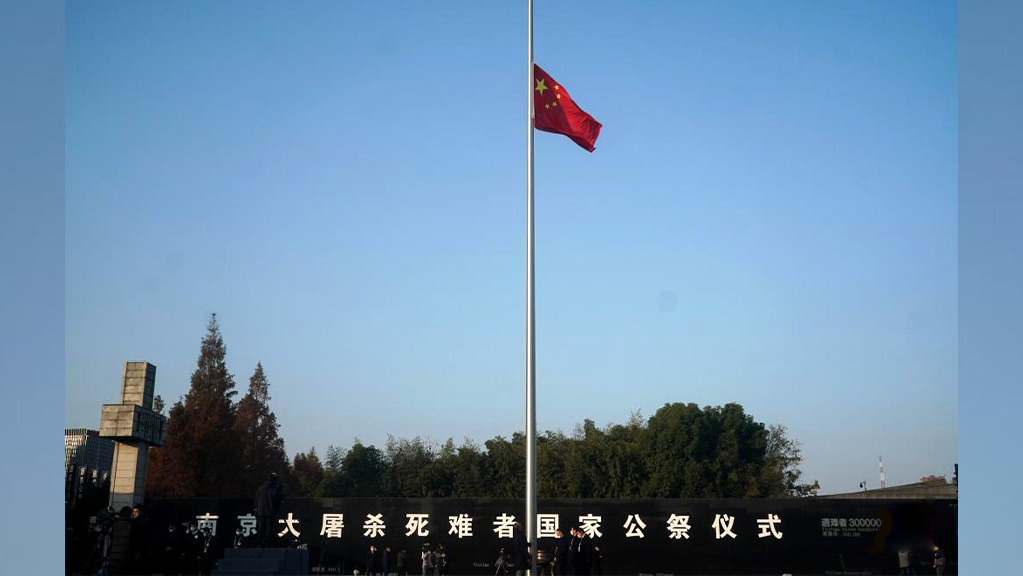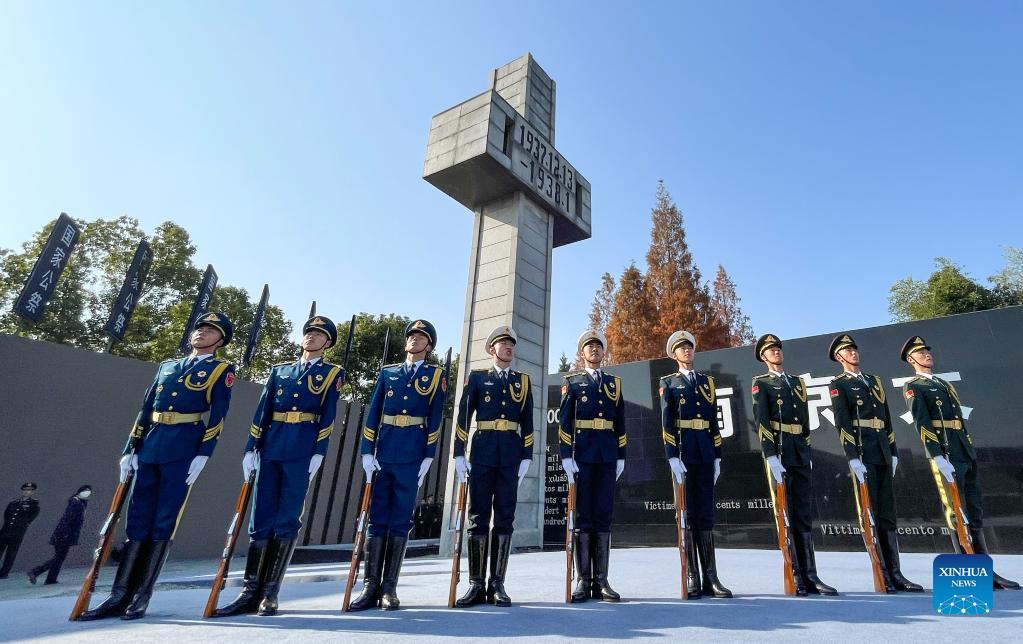
China's national flag flies at half mast ahead of the national memorial ceremony for the Nanjing Massacre victims at the Memorial Hall of the Victims of the Nanjing Massacre by Japanese Invaders in Nanjing, capital of east China's Jiangsu Province, December 13, 2021. /Xinhua
China's national flag flies at half mast ahead of the national memorial ceremony for the Nanjing Massacre victims at the Memorial Hall of the Victims of the Nanjing Massacre by Japanese Invaders in Nanjing, capital of east China's Jiangsu Province, December 13, 2021. /Xinhua
Editor's note: Anthony Moretti is an associate professor at the Department of Communication and Organizational Leadership of Robert Morris University. The article reflects the author's views and not necessarily those of CGTN.
Chances are you can remember your mother or father telling you many times when you were a child to "say 'I'm sorry' when you do something wrong, and mean it."
And if you are a parent, you know you have reminded your son or daughter of that a few times, too.
Unfortunately, the Japanese government refuses to appropriately apologize for the Nanjing Massacre, where horrible acts committed by Japanese soldiers against Chinese men, women and children took place between late 1937 and early 1938. Furthermore, occasional efforts by leading Japanese politicians to honor the country's World War II dead - including war criminals - at the Yasukuni Shrine adds to the tone deafness on display in Tokyo.
The numbers associated with what took place during that roughly six-week period are staggering. War crimes tribunals formed soon after the end of World War II offered grisly conclusions: approximately 300,000 Chinese people - roughly 50,000 per week - were murdered.
Japanese politicians have come close, but not close enough, in apologizing for what took place in Nanjing.
Yukio Hatoyama, former Japanese Prime Minister, said after he was out of office in 2013, "As a Japanese citizen, I feel that it's my duty to apologize for even just one Chinese civilian killed brutally by Japanese soldiers and that such action cannot be excused by saying that it occurred during war." He received strong criticism at home for what he said.
Tomiichi Murayama was prime minister in 1995 when he said, "During a certain period in the not too distant past, Japan, following a mistaken national policy, advanced along the road to war, only to ensnare the Japanese people in a fateful crisis, and, through its colonial rule and aggression, caused tremendous damage and suffering to the people of many countries, particularly to those of Asian nations."
Nowhere in either statement are the words that must be said before an apology can be taken seriously. There must be a clear admission that what took place specifically at Nanjing was inhumane, and the whole of Japan is apologizing for what happened there.
We know there remain pockets of Japanese society even today that refuse to admit what took place in Nanjing. This denial of history is not unique to Japan, and such disgusting denials of history are a stain on each person.

China holds its eighth national memorial ceremony for the Nanjing Massacre victims at the Memorial Hall of the Victims in Nanjing Massacre by Japanese Invaders in Nanjing, capital of east China's Jiangsu Province, December 13, 2021. /Xinhua
China holds its eighth national memorial ceremony for the Nanjing Massacre victims at the Memorial Hall of the Victims in Nanjing Massacre by Japanese Invaders in Nanjing, capital of east China's Jiangsu Province, December 13, 2021. /Xinhua
Other people take what appears to be perverse enjoyment and play "whataboutism" at a moment such as this. They (feebly) seek to explain away the sins of others by calling attention to other crimes against humanity and demand that we see those crimes as worse because more people were raped or murdered.
Playing "whataboutism" will not work in the discussion about Nanjing. Yes, a huge number of Jews were raped and murdered in the Holocaust. However, we must admit Germany apologized for what it did. Fully. Meaningfully. Completely. And it consistently tells its people to never forget the Holocaust.
But Japan? No such meaningful admission of guilt. No such consistency in talking about Nanjing.
Could you imagine Germany having been welcomed back into the world of nations had it not apologized for the Holocaust? Would there have been any chance for Germany to become the modern leader of the European economy if it had built a shrine to its war dead and included Nazi SS troops in it? Would Germany enjoy the international reputation it does today if it shrugged whenever Israel or another country demanded an apology for Nazi atrocities during World War II?
So, why does Japan get a pass for the rape and murder of at least 300,000 people? The international community also needs to push the Japanese government to say what must be said.
There has not been a believable, credible and formal apology from Tokyo. And recognizing that more than 80 years have passed since those vile few weeks in Nanjing, there is no reason to conclude Tokyo will.
Nanjing is now a vibrant city where about 9.3 million people live. It remains rich with Chinese history and culture, and it also is one of China's leading locations for higher education. It has recovered in the brick-and-mortar sense from the horrors of the late 1930s, but it - and the whole of China - deserves an apology for what took place there. Many men, women and children who survived did so with psychological scars that have never healed.
On December 13, China again recognizes the National Memorial Day for Nanjing Massacre Victims. That would be the perfect date for Japan to do the right thing.
(If you want to contribute and have specific expertise, please contact us at opinions@cgtn.com.)

